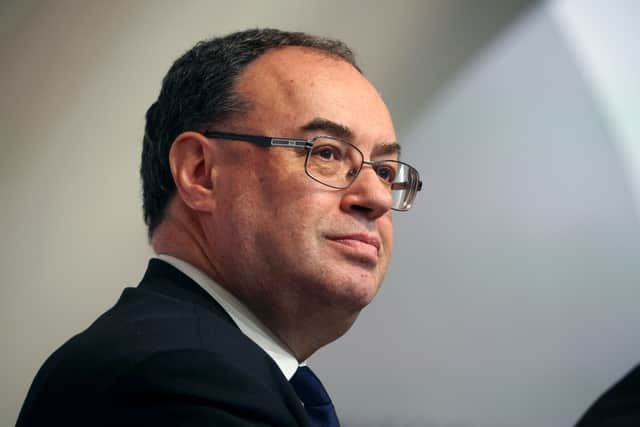Who is Bank of England governor? Andrew Bailey salary - and inflation and food shortages comments explained
and live on Freeview channel 276
The governor of the Bank of England, Andrew Bailey, has said that rising inflation rates in the UK are a “major concern.”
Bailey, who caused outrage in February after he advised employees in the UK to not ask for pay rises, met with the Treasury Select Committee on 16 May.
Advertisement
Hide AdAdvertisement
Hide AdOn 18 May, the UK inflation rate increased from 7% to 9%, making it the highest it has been since 1982.
Bailey claimed that rising inflation will impact consumer demand and is expected to increase unemployment.
Here’s everything you need to know about what the Bank of England governor has said.
Who is the Bank of England governor?
Andrew Bailey was appointed to the role of Bank of England governor in 2019 by Sajid Javid, who is now the Health Secretary.
Advertisement
Hide AdAdvertisement
Hide AdThe 63-year-old comes from Leicester and studied at Cambridge, achieving a PHD in history on the industrial revolution.


Bailey went into finance after working as a research assistant for the London School of Economics (LSE), before joining the Bank of England in 1985.
He is married to Cheryl Schonhardt-Bailey, who is head of the Department of Government at LSE.
Bailey has faced criticism in the past.
In September 2019, during his time as the chief executive of the Financial Conduct Authority (FCA), it was alleged that he had fallen asleep during meetings with advocates for the victims of the British Steel Pension Scheme.
Advertisement
Hide AdAdvertisement
Hide AdSpeaking to the Financial Times, solicitor Philippa Hann said: “There were a number of times when his (Bailey) head dropped and he had his eyes closed and he appeared to be sleeping.”
The incident led to discussion in parliament where MPs described the FCA as “asleep at the wheel”.
Bailey categorically denied the claims that he had fallen asleep during the meeting.
What is Andrew Bailey’s salary?
Bailey earns an eye-watering salary of £575,000 a year.
The Bank of England governor was criticised in February, when he told people not to ask for a pay rise, but then when asked, couldn’t remember how much he was paid - despite the mammoth sum.
Advertisement
Hide AdAdvertisement
Hide AdSpeaking with MPs at a Treasury meeting about inflation, Bailey was trying to justify requesting pay restraints to prevent inflation from rising.
Dame Angela Eagle MP asked the governor if he could tell her what the median care worker wage was and asked him what his pay was in comparison.
Bailey replied that it was "substantially higher" and when pressed for an exact figure said: “Um, it’s somewhere over £500,000 - I can’t tell you exactly what it was, I don’t carry that around in my head."
In response to the advice that workers in the UK should not receive pay increase, the Bank of England was labelled out of touch.
Advertisement
Hide AdAdvertisement
Hide AdNGO Positive Money tweeted: “The Bank of England governor Andrew Bailey has told workers not to ask for pay rises.
“He earns almost £300 an hour. Care workers earn £9 an hour. Is this why the Bank of England is out of touch?”
What did he say about food shortages and inflation?
Speaking with the Treasury Select Committee on 16 May, Bailey blamed the rising inflation on “outside forces and, particularly, energy prices and global goods prices.”
He explained that rising costs will impact demand and “increase unemployment.”
Advertisement
Hide AdAdvertisement
Hide AdCiting the war in Ukraine as a factor in rising food prices, he said: “It is a major worry for this country and a major worry for the developing world.”
Adding: “Sorry for being apocalyptic but that is a major concern.”
He reiterated that did not believe the Bank of England "could have done anything differently" to avoid the high inflation rate, saying: "we can’t predict things like wars - that’s not in anybody’s power.”
What is the rate of inflation in the UK?
The rate of inflation in the UK is the highest it has been for 40 years.
Advertisement
Hide AdAdvertisement
Hide AdAs of May, the rate was at 9%, with the Bank of England expecting this to rise to 10% in the final quarter of 2022.


High inflation means that consumers have to pay a lot more for items than they previously did.
It can impact energy prices, food prices and petrol prices, which consumers have seen rise to record levels in the UK in recent months.
Comment Guidelines
National World encourages reader discussion on our stories. User feedback, insights and back-and-forth exchanges add a rich layer of context to reporting. Please review our Community Guidelines before commenting.
